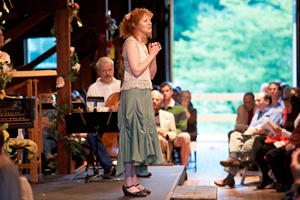by James Flood

The program is an ingenious conception of Apollo’s Fire (AF) director, Jeanette Sorrell, and was apparently the fruit of considerable research. The performance was broken up into eight sections, with the first two sections covering songs of the Scottish and Irish immigrants to the America bidding sad farewell to their land, family and sweethearts. From there the sections weaved through a rich tapestry of the dark, the joyful, the sad, and the humorous, all of which the deep treasury of Appalachian music encompasses. Included also were stories and poetry. Sorrell arranged the majority of the songs for the 8-part ensemble. At times songs segued seamlessly into one another to add to the sense of a journey through time. In a few instances an instrumental song would start out very simply with one or two players then gradually add more members building to a rollicking climax. The performers all wore clothing that conjured the styles of 19th century mountain folk. The logic of song sequence and changes of moods were beautifully placed and yielded a powerful effect.
Soprano Amanda Powell and tenor Ross Hauck did a superb job of fronting the performance with singing and dramatizations. Both are accomplished and well-traveled veterans of classical vocal performance, but also come from backgrounds that included Appalachian music. Along with their history, their natural musical talent, and ample acting skills, they were fully capable of entering into the style of Appalachian music as well as taking on mountain folk personae.
Amanda Powell has a lovely, light and smooth soprano voice. She sometimes adds generous ornamentation and knows how to pull back on operatic resonance for an authentic folk style. Particularly moving was her passionate performance of “Once I Had a Sweetheart.”
Ross Hauck possesses a powerful voice and took on a “good ol’ boy” personality. His formidable unaccompanied performance of “Just Before the Battle, Mother” was magnificently interpreted. As “Just Before the Battle” concluded, Powell joined Hauck for a very moving unaccompanied version of the southern spiritual “Go March Along” whose text dovetailed beautifully with the previous song. Also of special note were their powerful duets in the spiritual “Oh Mary, Don’t You Weep” and “Wayfaring Stranger.” Powell and Hauk also spiced up the program with a good bit of comedy, which apparently included some improv. Even Sorrell sometimes seemed to be pleasantly caught off guard.
The instrumentalists Sorrell gathered for the ensemble were a select crew. Each deserves special mention. Often playing in unison, the fiddle, hammered dulcimer, wooden flute, and harpsichord achieved a tight ensemble in those fast and exuberant dance melodies that are so characteristic of Appalachian music and its antecedents. The players even broke into vocal harmony together at times to nice effect. Amanda Powell and hammered dulcimer player Tina Bergman sometimes added percussion.
While her bio boasts accomplishments as a classical violinist, Susanna Perry Gilmore played fiddle with precision and verve. She is the real McCoy.
Playing wooden flutes and tin whistle, Kathie Stewart performed a haunting and mournful unaccompanied solo, “Se Fath Mo Buartha” (“The Cause of All My Sorrow”).
Hammered dulcimer player Tina Bergman was amazing in her own arrangement of a medley of three songs, “Pretty Betty Martin,” “Katy Did,” and “Red Rockin Chair,” that led into a lively group of upbeat dances
Brian Kay skillfully played an assortment of plucked stringed instruments—lute, guitar, banjo, and long-necked dulcimer. Using the long-necked dulcimer Kay accompanied himself singing “Nottamun Town,” using a nice falsetto for the higher notes.
Cellist Rene Schiffer, sometimes providing a bass line and sometimes joining in on doubling lively melodic lines, also composed a dueling solo piece that was both riveting and delightful.
Apollo’s Fire’s “Glory on the Mountain” of Apollo’s Fire is an absolutely joyous achievement. See it/hear it if you can. Bravo!
Published on ClevelandClassical.com June 18, 2014.
Click here for a printable copy of this article.


